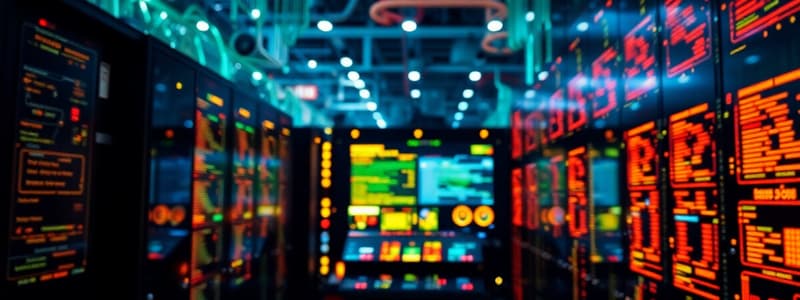Podcast
Questions and Answers
What is the primary distinction between data and information?
What is the primary distinction between data and information?
- Data is processed; information is raw facts.
- Data can be structured; information cannot.
- Data is always digital; information is always analog.
- Data is contextless; information provides meaning. (correct)
What encompasses an information system?
What encompasses an information system?
- Only software and data management.
- Just hardware and network components.
- A combination of technology, people, and processes. (correct)
- Only technology and processes.
Which of the following technologies is characterized by decentralized digital ledger technology?
Which of the following technologies is characterized by decentralized digital ledger technology?
- Artificial Intelligence
- Blockchain (correct)
- Cloud computing
- Big Data analytics
What aspect does digital transformation primarily address?
What aspect does digital transformation primarily address?
What is a significant challenge associated with the increasing use of technology?
What is a significant challenge associated with the increasing use of technology?
Flashcards are hidden until you start studying
Study Notes
Definition of Information and Technology
- Information: Data that is processed, organized, or structured to provide meaning.
- Technology: Tools, machines, software, and systems used to solve problems and enhance productivity.
Key Concepts
-
Information Systems:
- Combination of technology, people, and processes.
- Used to collect, store, manage, and distribute information.
-
Data vs. Information:
- Data: Raw facts and figures without context.
- Information: Data that is processed and contextualized.
-
Types of Technology:
- Hardware: Physical components (computers, servers, networking devices).
- Software: Programs and applications (operating systems, databases).
-
Emerging Technologies:
- Artificial Intelligence (AI): Machines that mimic cognitive functions.
- Blockchain: Decentralized digital ledger technology for secure transactions.
- Internet of Things (IoT): Network of interconnected devices that communicate and exchange data.
-
Digital Transformation:
- Integration of digital technology into all areas of a business.
- Changes how organizations operate and deliver value to customers.
Importance
- Enhances efficiency and productivity across various sectors.
- Facilitates communication and collaboration.
- Drives innovation and economic growth.
Challenges
- Data Security: Protecting sensitive information from unauthorized access.
- Privacy Concerns: Managing personal data and user consent.
- Technology Dependence: Over-reliance on technology can lead to vulnerabilities.
Future Trends
- Increased use of AI and machine learning for data analysis.
- Growth of remote work technology and virtual collaboration tools.
- Expansion of 5G technology enhancing connectivity and speed.
Impact on Society
- Changes in job markets and required skills.
- Influence on education with e-learning and online resources.
- Transformations in healthcare through telemedicine and health informatics.
Definition of Information and Technology
- Information refers to processed data that provides meaning and context.
- Technology encompasses tools, machines, software, and systems designed to solve problems and improve productivity.
Key Concepts
- Information Systems integrate technology, people, and processes to effectively collect, store, manage, and disseminate information.
- Data consists of raw facts lacking context, while Information is data that has been processed and contextualized for use.
- Types of Technology:
- Hardware includes tangible components like computers, servers, and networking devices.
- Software encompasses programs and applications such as operating systems and databases.
- Emerging Technologies:
- Artificial Intelligence (AI) enables machines to replicate human cognitive functions.
- Blockchain provides a decentralized digital ledger that ensures secure transactions.
- Internet of Things (IoT) connects devices that communicate and share data over the internet.
- Digital Transformation signifies the incorporation of digital technologies in business to improve operations and customer value.
Importance
- Technology boosts efficiency and productivity across diverse sectors.
- Enhances communication and collaboration among individuals and teams.
- Fuels innovation and contributes to economic growth.
Challenges
- Data Security involves protecting sensitive information from unauthorized access.
- Privacy Concerns require careful management of personal data and acquiring user consent.
- Technology Dependence indicates potential vulnerabilities arising from excessive reliance on technology.
Future Trends
- Anticipated rise in the application of AI and machine learning for advanced data analysis.
- Expansion of tools supporting remote work and virtual collaboration is expected.
- Growth of 5G technology will enhance connectivity and data transmission speed.
Impact on Society
- Job markets are evolving, necessitating new skills for future employment opportunities.
- Education is being transformed through e-learning platforms and online resources.
- Healthcare is experiencing innovations like telemedicine and health informatics, improving access to services.
Studying That Suits You
Use AI to generate personalized quizzes and flashcards to suit your learning preferences.




